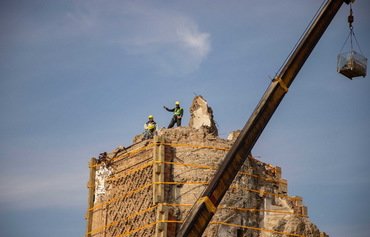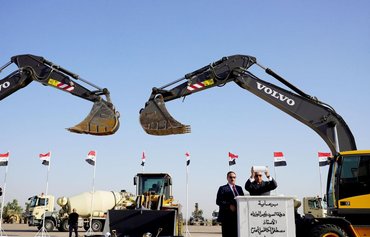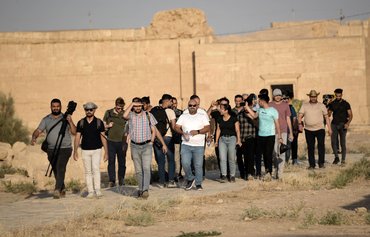Significant reconstruction activity is under way in the Ninawa provincial capital of Mosul, transforming the city's appearance five years after it was left in ruins by the "Islamic State of Iraq and Syria" (ISIS).
Reconstruction projects are now progressing at an accelerated pace, after years of stalling and delays, in response to calls for a faster pace to restore the lustre of the historic city and meet the needs of its residents.
The Iraqi government formed a supreme central committee in March 2021 to oversee the implementation of a sweeping public services rehabilitation plan.
Efforts are focused on rehabilitating health sector institutions with projects to upgrade the Mosul General and al-Jumhouri hospitals, overhaul the road network, bridges and civil airport and rehabilitate the Old City riverfront.
![Workers spread asphalt on Mosul's Third Bridge on July 2, after the completion of repair work. [Ninawa province Facebook page]](/cnmi_di/images/2022/07/26/36384-bridge-mosul-asphalt-600_384.jpg)
Workers spread asphalt on Mosul's Third Bridge on July 2, after the completion of repair work. [Ninawa province Facebook page]
![Iraqi Prime Minister Mustafa Kadhemi visits the University of Mosul's rehabilitated library building on July 9. [Kadhemi press office]](/cnmi_di/images/2022/07/26/36385-mustafa-kadhemi-mosul-600_384.jpg)
Iraqi Prime Minister Mustafa Kadhemi visits the University of Mosul's rehabilitated library building on July 9. [Kadhemi press office]
In April, the committee announced that its plan includes the implementation of 249 projects financed from the annual funds allocated to Ninawa by the state treasury, which were frozen after ISIS seized control of the city.
This represents a 400 billion IQD ($273 million) investment in the city.
This is in addition to a 1.15 trillion IQD ($789 million) allocation from the Emergency Support Law to finance urban projects in the health, education and housing sectors, especially in the Old City, destroyed during the fighting.
"Reconstruction operations are progressing at great pace," Mosul district commissioner Ameen al-Maamari told Al-Mashareq, commending the government's "outstanding attention and tireless efforts" to uplift the city.
Prime minister's visit
Iraqi Prime Minister Mustafa al-Kadhemi visited Mosul on July 9 -- his third visit to the city since taking office, timed to coincide with the fifth anniversary of its liberation -- to monitor the progress of a number of service-related projects.
In Mosul, he officially reopened the rehabilitated Corniche Oberoi Street and inspected completed reconstruction work at the University of Mosul and government institutions.
Work has been completed on projects to rehabilitate municipal offices and infrastructure damaged during the fighting, such as water and electricity networks and roads, al-Maamari said.
Efforts are focused on large strategic projects at present, chiefly Mosul International Airport, he said.
Additionally, the health sector network is being upgraded as hospitals are put into service, he said, among them the completed Hematology Hospital building, the German Hospital, Ibn al-Atheer Hospital and Ibn Sina Hospital.
It will be vital in the days ahead to maintain the stable security situation in Mosul so that construction can continue and to encourage investments and development, he said.
Despite the rehabilitation campaigns taking place in the city, the rubble of houses and buildings in the Old City on the west bank of the Tigris (known as the right bank) continues to remind residents of the travails of life under ISIS.
City still bears scars
"The marks left by the fighting still mar the city's appearance and remind people of the tragedies of terrorism and war," said Abdul Karim Hassan, a resident of Mosul's Ras al-Kur district.
"A great deal of work has been done to remove the rubble, repair streets and markets, and restore basic services in some old neighbourhoods," he said.
"There are still many destroyed houses, however, and their owners need money to rebuild them," he told Al-Mashareq. "We hope the government will do everything in its power to uplift our city and give people their just rights."
The fierce battles to drive ISIS from Mosul's Old City destroyed more than 12,000 housing units, several hundred of which were rebuilt with the support of the United Nations (UN) and the Ninawa provincial government.
Mosul "is undoubtedly recovering, and its situation is now better than it was two or three years ago, especially on the east (left) bank of the city", Al-Sukar district resident Nasreen Ali told Al-Mashareq.
"We are hoping for more construction and diligent work toward the completion of service-related projects, attraction of investments, and also for attention to be given to the restoration of the city's historical landmarks and identity," she said.
National and international bodies are co-operating to reconstruct the Old City's heritage through UNESCO's "Revive the Spirit of Mosul" project, which aims to restore 50 heritage buildings.
Among them are the famed al-Nuri Mosque and two churches, al-Tahira and al-Saa.
This project provides more than 3,000 job opportunities for young Iraqis in heritage crafts and building repair, UNESCO said.
Meanwhile, the USAID (US Agency for International Development)/Iraqi Community Resilience Initiative (ICRI-Taafi) is incubating youth initiatives to preserve Mosul's cultural heritage and legacy.
It also provides support to dozens of organisations and volunteer teams, helping them in their efforts to provide aid to residents affected by terrorism, revive their neighbourhoods and strengthen the foundations of stability.

![Muslims gather to pray in the courtyard of Mosul's famed al-Nouri mosque during Eid al-Adha, on July 9. [Zaid al-Obeidi/AFP]](/cnmi_di/images/2022/07/26/36383-Nouri-mosque-Mosul-600_384.jpg)






